九年级英语14单元教案教学内容
- 格式:docx
- 大小:14.73 KB
- 文档页数:17
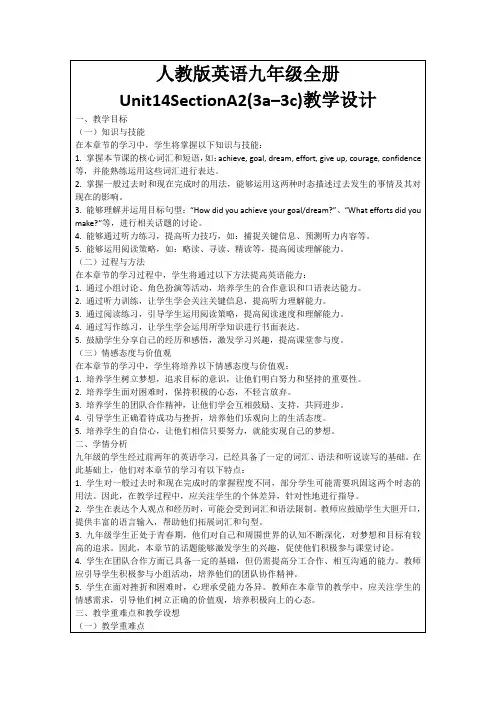
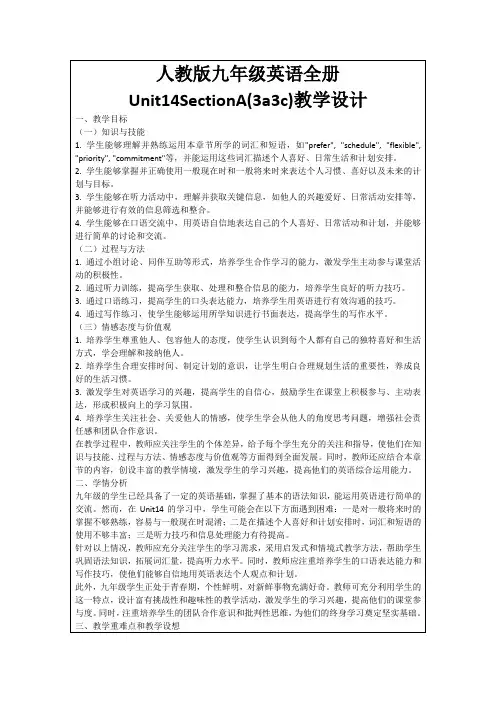
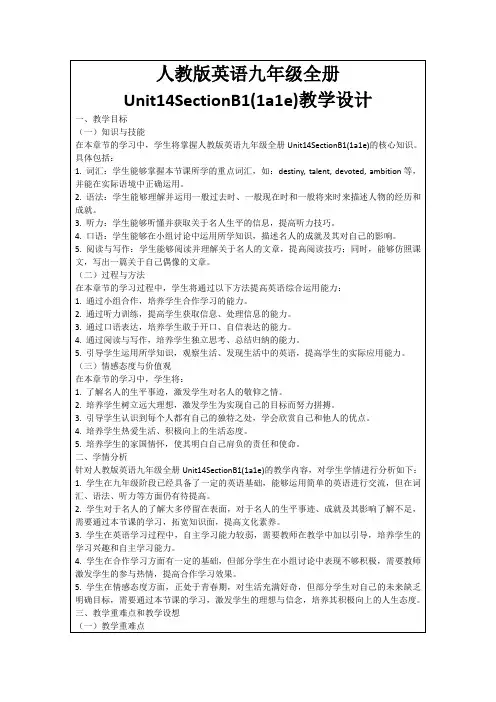
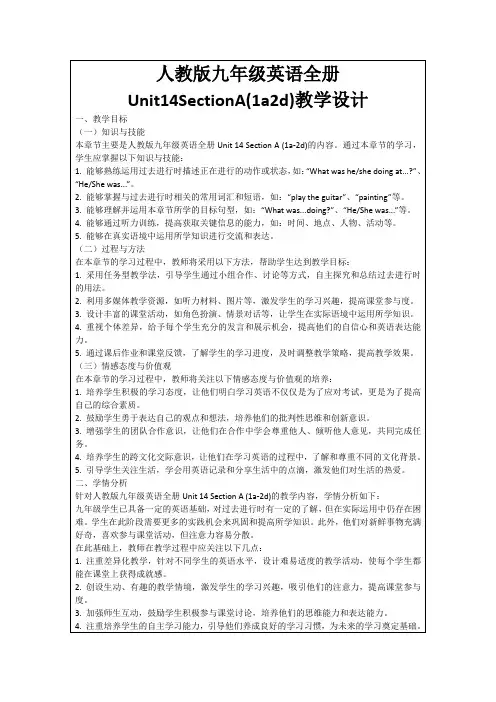
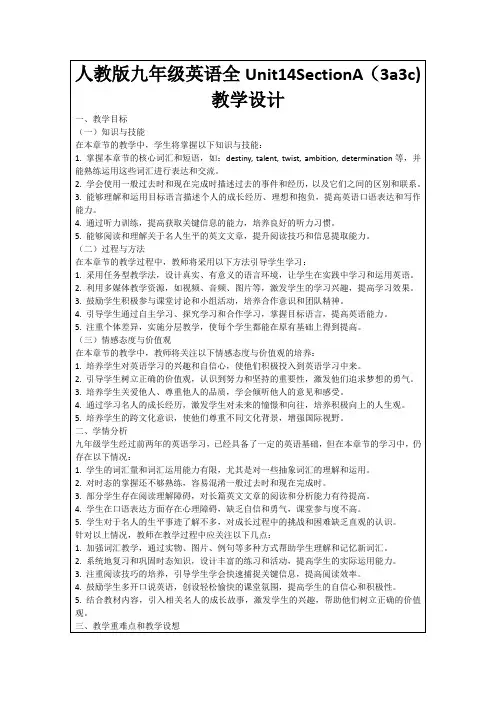
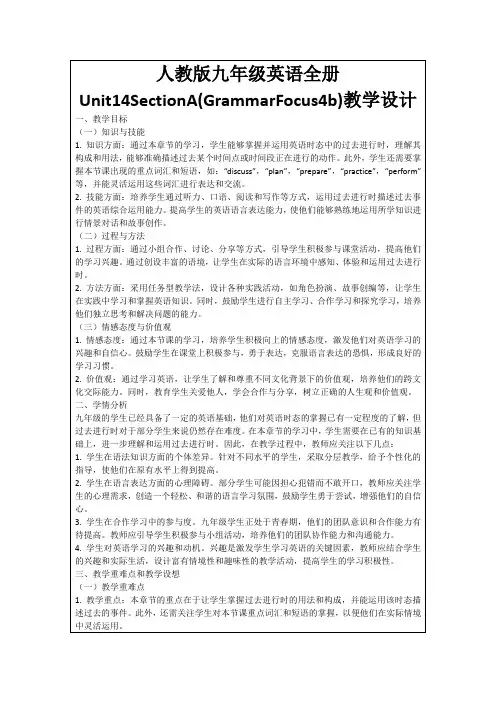
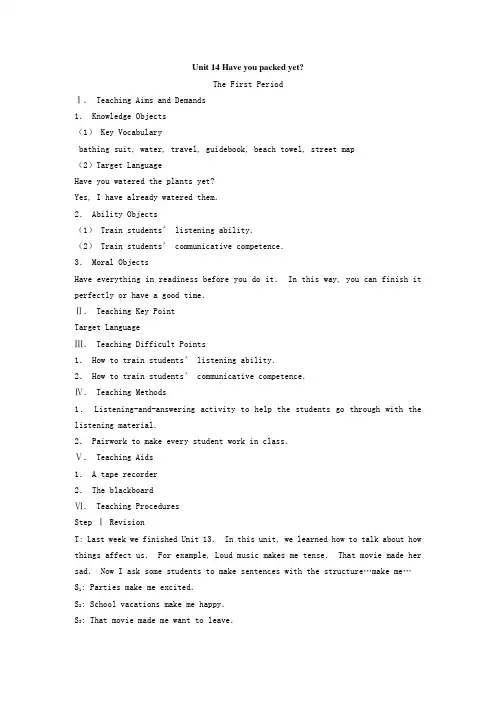
Unit 14 Have you packed yet?The First PeriodⅠ. Teaching Aims and Demands1. Knowledge Objects(1) Key Vocabularybathing suit, water, travel, guidebook, beach towel, street map(2)Target LanguageHave you watered the plants yet?Yes, I have already watered them.2. Ability Objects(1) Train students’ listening ability.(2) Train students’ communicative competence.3. Moral ObjectsHave everything in readiness before you do it. In this way, you can finish it perfectly or have a good time.Ⅱ. Teaching Key PointTarget LanguageⅢ. Teaching Difficult Points1. How to train students’ listening ability.2. How to train students’ communicative competence.Ⅳ. Teaching Methods1. Listening-and-answering activity to help the students go through with the listening material.2. Pairwork to make every student work in class.Ⅴ. Teaching Aids1. A tape recorder2. The blackboardⅥ. Teaching ProceduresStep Ⅰ RevisionT: Last week we finished Unit 13. In this unit, we learned how to talk about how things affect us. For example, Loud music makes me tense. That movie made her sad. Now I ask some students to make sentences with the structure…make me…S1: Parties make me excited.S2: School vacations make me happy.S3: That movie made me want to leave.S4: The story made me cry.S5: The awful picture makes me nervous.T: Very good. From today on, we will learn Unit 14. Now. I ask a student to come to the blackboard and write the numbers 1 to 20 on the blackboard.(After the student has written the numbers 1 through 5, start talking to the rest of the class)T: Has he written the number 1 yet?Class repeat the question. Has he written the number 1 yet?S s: Has he written the number 1 yet?T: (Pointing to the number 1 on the board) Yes, he has already written the number 1. Class repeat. Yes, he has already written the number 1.S s: Yes, he has already written the number 1.T: (Writing the word already on the blackboard) This is the word already.Class repeat. Already. Look at the blackboard.(pointing to the blackboard)Has he written the number 50 yet? Class repeat the question. Has he written the number 50 yet?S s: Has he written the number 50 yet?T: (Pointing to the highest number already on the blackboard)No, he hasn’t written the number 50 yet. Class repeat. No, he hasn’t written the number 50 yet.S s: No, he hasn’t written the number 50 yet.T: (Writing the word yet on the blackboard)Tish is the word yet.Class repeat. Yet. Now, look at the two words already and yet. Which one is used to talk about things that have happened in the past?SSs: Already.T: Yeah. Very good. So the other word yet is used to talk about things that will happen in the future. Yeah?SS: Yes.Step Ⅱ 1aThis activity introduces key vocabulary and helps students review vocabulary they already know.Read the instructions aloud to the class.Say, Who can give an example of a beach vacation and sightseeing in a city? Ask a student to give the example.(bathing suit, travel guidebook)Get students to add some things to the lists under the two headings. A beach vacation and Sightseeing in a city. Have students do the work individually first.While they are working, walk around the classroom checking the progress of the students.Let students tell the class the words they wrote.Write the words on theblackboard. Read them and let students repeat. Then ask other students to add other words to the lists.Sample answersStep Ⅲ 1bThis activity gives students practice in understanding the target language in spoken conversation.Look at the picture. Ask, What can you see in the picture? (There is a family in the picture. They are getting ready for a beach vacation)Point to the box. Invite a pair of students to read the conversation to the class.A: Have you packed the beach towels yet?B: No, I haven’t.Look at the six chores on the list. Let students read each item, then ask different students to explain the meaning of each item in their own words. Make sure students understand the meaning of each item.Go through the instructions with the class. Point to the blank lines in front of each item in the list. Say, You will hear a family talking as they get ready to go on vacation. Listen carefully. Make sure what the family talks about and put a checkmark in front of each chore that is already done.Play the tape. The first time students only listen. Play the tape a second time.Now listen to the tape again. This time please put your checkmarks on the correct blanks. Check the answers with the whole class.AnswersTapescriptWoman: Have you packed the beach towels yet?Boy: No, I haven’t. Can’t Judy pack them?Woman: No, she’s busy. Could you please water the plants?Boy:I’ve already watered them.Woman: Oh, thanks.Man: What about the travel guidebook and the street map?Woman: I’ve already bought the travel guidebook, but I haven’t got the street map yet.Man: That’s OK. I’ll get it. Have you packed the camera?Boy: Yes. I’ve already put it in my suitcase.Woman: Well, I guess that’s everything.Boy: Almost everything. We haven’t locked the windows yet.Step Ⅳ 1cThis activity provides guided oral practice using the target language.Go through the instructions with the whole class. Look at the example in the box. Invite a pair of students to read it to the class.S A: Have you watered the plants yet?S B: Yes, I have already watered them.Tell students they will be making conversations with a partner. Look back at the chores in Activity lb. Say, Now look back at the chores in Activity lb. Make conversations talking about what the family members have already done and what they haven’t done yet, using words from the chores, such as packed the camera, locked the windows, bought a street map.While students are working in pairs, walk around the classroom and listen to some pairs. If necessary, offer language support. Then get several pairs of students to say their conversations to the class.Conversation 1S A: Have they packed the camera yet?S B: Yes, they have already packed the camera.Conversation 2S A: Have they bought a street map yet?S B: No, they haven’t bought a street map yet.Notes1. pack—(here)get ready for a journey by doing this2. guidebook—book for travellers, tourists, etc, with information about a place 3. Have you watered the plants yet?Yes, I have already watered them: PresentPerfect Tense. The structure is have+ p. p. Pay attention to the two words already and yet. Already is used in affirmative sentences; while yet is used in negative and interrogative sentences.Step Ⅴ SummaryIn this class, we’ve learned some important words, such as water, travel, guidebook, beach towel. We’ve also learned the target language. Have you watered the plants yet? Yes, I have already watered them.Step Ⅵ HomeworkMake conversations in pairs to review the target language.Step Ⅶ Blackboard DesignUnit 14 Have you packed yet?The Second PeriodⅠ. Teaching Aims and Demands1. Knowledge Objects(1) Key Vocabularyrefrigerator, garage, suitcase, clean out, put in, turn off (2) Target LanguageHave you watered the plants yet?No, I haven’t.Have you packed the camera yet?Yes. I’ve already put it in my suitcase.Have you fed the cat?No. I haven’t fed her yet.2. Ability Object(1) Train students’ listening ability.(2) Train students’ speaking ability.3. Moral ObjectWe must be ready with our work before we do it.Ⅱ. Teaching Key Points1. Key Vocabularyclean out, put in, turn off2. Target LanguageHave you watered the plants yet?No, I haven’t.Have you packed the camera yet?Yes. I’ve already put it in my suitcase.Have you fed the cat?No. I haven’t fed her yet.3. StructuresHave you packed the camera yet?Yes. I’ve already put it in my suitcase.Have you fed the cat?No. I haven’t fed her yet.Ⅲ. Teaching Difficult Points1. the target language2. How to train students’ listening ability.Ⅳ. Teaching Methods1. Listening method to improve the students’ listening ability.2. Pairwork to make every student work in class.Ⅴ. Teaching Aids1. A tape recorder2. The blackboardⅥ. Teaching ProceduresStep I RevisionCheck homework.Get some pairs to read their conversations.Collect their conversations and help students correct any mistakes.Step Ⅱ 2aThis activity provides guided listening practice using the target language.Look at the picture. Ask, What can you see in the picture? (A boy and a girl are in the kitchen. They both look a little stressed out)Go through the instructions with the class. You will hear a boy and a girl talking about getting ready to go on vacation. Write M after each thing that Mark says and T after each thing that Tina says.Look at the sample answer. Say, Tina said, No. I haven’t cleaned out the refrigerator yet. Get students to repeat No. I haven’t cleaned out the refrigerator yet.Play the recording for students the first time. This time students only listen to the recording. Play the recording a second time. This time let students write Min front of Mark’s statements, and T in front of Tina’s statements.Check the answers with the class.Answers1. T 2. T 3. M 4. T 5. M 6. TTapescriptBoy: Mom and Dad said they want to leave in ten minutes. Are you ready, Tina? Girl: No. I haven’t cleaned out the refrigerator yet. I have to do that right now.Boy: Tina! You’re unbelievable. What about your bike?Girl: I’ve already put it in the garage. But I haven’t locked the garage yet.That’s your job, Mark.Boy: I know. I’ve already done most of my jobs. I’ve taken out the trash.Girl: Have you fed the cat yet?Boy: Not yet. I’ll do it in a minute. Have you turned off your radio?Girl: Yes, I have. I think we’re almost ready.Step Ⅲ 2bThis activity provides guided listening practice using the target language.Go through the instructions with the class. Look at the list of questions with blanks in front of each one. Then look back at the statements in Activity 2a.Say, Some of the statements in Activity 2a are answers to questions in Activity 2b. Write the number of the correct answer from Activity 2a in front of each question in Activity 2b.Get several students to read the questions in Activity 2b to the class. Look at the sample answer. Ask a student to read the question and answer to the class.Are you ready, Tina?No, I haven’t cleaned out the refrigerator yet.Play the recording for students.Let students write their answers in the blanks. Play the recording again if necessary.Correct the answers.AnswersHave you fed the cat yet? 5What about you bike? 2Are you ready, Tina? 1Have you turned off your radio? 6Step Ⅳ 2cThis activity provides guided oral practice using the target language. Look at the sample conversation in the speech bubbles. Invite a pair of students to read it to the class.S A: Are you ready, Tina?S B: No. I haven’t cleaned out the refrigerator yet.Go through the instructions with the class.Say, With your partner make a conversation using information from Activities 2a and 2b. Have students work in pairs. While they are working, walk around the classroom checking the progress of the pairs and offering help as needed.Invite two pairs to say their conversations to the class.Conversation 1S A: Have you fed the cat yet?S B: Not yet. I’ll do it in a minute.Conversation 2S A: Have you turned off your radio?S B: Yes, I have.Step Ⅴ Grammar FocusLook at the grammar focus box. Get three students to read the questions and answers to the class.Have you watered the plants yet?No, I haven’t.Have you packed the camera yet?Yes. I’ve already put it in my suitcase.Have you fed the cat?No. I haven’t fed her yet.Let students make up other sentences in pairs using have you…yet questions. For example: Have you had lunch yet? Have another student answer truthfully: Yes, I have or Yes, I have already had lunch, or No, I haven’t had lunch yet.Pay attention to the use of already and yet. Say, When we use the words have and already, we are talking about something that happened in the past, but not a long time ago. When we use the words haven’t and yet, we are talking about something that will happen in the future, but not a long time from now. It will happen soon. For example: I’ve already had breakfast, but I haven’t had lunch yet.Draw a simple diagram to help students understand the grammar focus.Get some pairs to say their sentences aloud to the class.A sample sentenceI’ve already had lunch, but I haven’t had supper yet.Culture noteMany Americans are used to taking at least one vacation trip a year. But in China, some of the students may not be in the habit of taking an annual vacation, or even making a trip to another city. For some students, financial limitations and family obligations make such travel impossible. For others, it may be that taking trips is not something that is common in their home culture.Step Ⅵ SummaryIn this class, we’ve learned key vocabulary clean out, put in, turn off and the targetlanguage Have you watered the plants yet? No, I haven’t. Have you packed the camera yet? Yes, I’ve already put it in my suitcase. Have you fed the cat? No. I haven’t fed her yet.Step Ⅶ HomeworkGet students to write some sentences according to the target language.Step Ⅷ Blackboard DesignUnit 14 Have you packed yet?Section AThe Second PeriodTarget languageA: Have you watered the plants yet?Unit 14 Have you packed yet?The Third PeriodⅠ. Teaching Aims and Demands1. Knowledge Objects(1) Key Vocabularychop, wood, light, village, well, farm(2) Target LanguageHave you bought a newspaper?Yes, I’ve already bought a newspaper.2. Ability Objects(1) Train students’ integrating skills.(2) Train the ability of expressing students’ own opinions.3. Moral ObjectsWe should make a plan for our everyday activities and make a schedule. It can remind us how to spend the time. It is good for our study and life.Ⅱ. Teaching Key PointTrain students’ integrating skills.Ⅲ. Teaching Difficult PointHow to improve students’ integrating skills.Ⅳ. Teaching Methods1. Fast-reading method2. Groupwork and pairworkⅤ. Teaching Aids1. A projector2. The blackboardⅥ. Teaching ProceduresStep I RevisionT: Yesterday we learned the target language. The structure is Have you…yet? Yes. I’ve already…Have you…?No. I haven’t…yet.Now who can make sentences using the structure?S1: Have you turned off your radio yet?S2: Yes. I’ve already turned it off.S1: Have you finished your homework?S2: No. I haven’t finished it yet.T: Very good.Step Ⅱ 3aThis activity provides reading practice using the target language.Show the key vocabulary words on the screen by a projector.Read the words and ask students to repeat again and again until they can pronounce the words fluently and accurately.Before reading the e-mail message, ask the students what chores do you usually do? Please tell me.(do my homework, clean my room, water the plants, clean our classroom etc.)Go through the instructions with the class. Look at the e-mail message. Let a student read the e-mail aloud to the class.Correct any pronunciation errors to make sure the student is providing a good model for the rest of the class.Get students to read the e-mail message individually, and underline the different chores on their own,Check the answers with the class.Answers1. do my homework2. take the dog for a walk3. water my mom’s plants4. do some shopping5. chop wood6. light the fire7. collect water8. feed the animalsLet students read the e-mail again for further comprehension. While they are reading. Walk around the classroom, offering help if they have any words or phrases they don’t understand.Notes1. chore—small duty or piece of work, especially ordinary everyday task(in the home, on a farm, etc.)In the e-mail message, there are many chores, such as do my homework, take the dog for a walk, water my mom’s plants.2. chat—talk about unimportant things3. kid—(sl) child; young person4. well—(here n.)shaft, usually lined with brick or stone, for obtaining water from an underground source5. anyway—in any possible way; by any possible meansStep Ⅲ 3bThis activity provides reading, writing. listening and speaking practice using the target language.Look at the pictures of the three people and read their names aloud to the class.Then point to the chart. Let students read the information in it. Make sure students understand the information in the chart by asking questions and point out things.T: Look at the three pictures above the chart. Under each person is a list of the things he or she has done or will do today. Now look at the chart. What do you see in the first column?S1: Numbers. Clock times.T: That’s right. Those are clock times.Those times show what the three people were doing at 9:00,at 10:00,and so forth. It is 12:00 noon now. so the 1:00 and 2:00 times show things they will do later today. What has Steve already done?S2: He’s already done his homework.He’s already bought a newspaper.He’s already fed the dog.T: That’s correct. What things hasn’t he done yet?S3: He hasn’t watered the plants. He hasn’t cleaned his room.T: OK. Very good.Go through the instructions with the class. Put students in several groups.Say, Each student in a group will decide to be one of the people. The other students in the group will ask questions to find out which person in the chart he or she has decided to be. Make sure students understand how to do the exercise.Look at the example in the box. Invite a pair of students to read it aloud to the class.S A: Have you bought a newspaper?S B: Yes, I’ve already bought a newspaper.Ask students, which of the three people could it be? Can you find out? Yeah. It could be Steve or Elise.Get students to do the work in groups.While they are working, move around the classroom checking the work of each group.Ask two groups to do the work as the examples.Group 1: Have you watered the plants?S1: Yes. I’ve already watered the plants.Group 2: Have you fed the dog?S2: No. I haven’t fed the dog yet.(Person 1: Kathy; Person 2: Elise)Step Ⅳ Part 4This activity provides reading, writing, listening and speaking practice using the target language.Go through the instructions with the class.Invite a good student to give an example of things that he or she has and hasn’t done this week: I have done my homework. But I haven’t done some shopping.Put students in some groups of three. Let students complete the work in groups.Finish the table.Review the task. Get some groups to share the results of their surveys.Sample answersOptional activityAsk students to write their own schedules, listing the time of day they do each thing. Then get students to work in pairs. Student A thinks of one activity.Student B gets five tries to guess the activity. Then student B thinks of an activity and student A guesses what it is.Step Ⅴ SummaryIn this class, we’ve learned some key vocabulary words such as chop, wood, light.village, well, farm. We’ve also done a lot of reading, writing and speaking practice using the target language.Step Ⅵ Homework1. Finish off the exercises on pages 57~58 of the workbook.2. Get students to talk about the things they have done and they haven’t done yet this week in pairs.Step Ⅶ Blackboard DesignUnit 14 Have you packed yet?The Fourth PeriodⅠ. Teaching Aims and Demands1. Knowledge Objects(1) Key Vocabularymember, original, songs, award(2)Target LanguageHave they been on TV yet?Yes, they’ve been on TV lots of times.2. Ability Object(1) Train students’ speaking and listening ability.(2)Train students’ability to understand the target language in spoken conversation.(3) Train students’ ability to use the target language.3. Moral ObjectLove music and you can benefit from it.Ⅱ. Teaching Key Points1. Key Vocabularymember, original, songs, award2. Target LanguageHave they been on TV yet?Yes, they’ve been on TV lots of times.Ⅲ. Teaching Difficult Points1. How to train students’ speaking and listening ability.2. How to use the target language.Ⅳ. Teaching Methods1. Listening method2. Groupwork to make every student work in class.Ⅴ. Teaching Aids1. A tape recorder2. The blackboardⅥ. Teaching ProceduresStep I RevisionCheck homework. Ask some pairs to say their conversations to talk about the things they have done and they haven’t done yet this week.S A: Have you done your homework?S B: Yes, I’ve already done my homework.S A: Have you cleaned your room?S B: No, I haven’t cleaned my room yet.Step Ⅱ Part 1This activity introduces key vocabulary, and helps students review vocabulary they already know.Look at the picture. Ask, What can you see in the picture? (A man is playing the guitar and singing a song)Point to the box. Invite a student to read the four questions. Make sure students understand the questions. Get students to fill in the blanks on their own. A moment later, ask several students to read their answers to the class.Notes1. favorite—(adj.)best liked2. What is your favorite band?—What band do you like best?3. band—group of persons who play music together4. band member—member of a bandStep Ⅲ 2aThis activity gives students practice in understanding the target language in spoken conversation.Look at the picture. A record agent is interviewing members of a band. Let students read the instructions. Point to the headings and the blank lines following each heading. You will hear a woman interviewing members of a band. They are talking about the band. Now, listen and write your answers on these blank lines.Play the recording the first time. This time students only listen. Play the recording a second time. This time, ask students to write their answers on the blank lines as they listen to the recording. Play the tape again if necessary.Check the answers with the class.AnswersBand’s name: Apple Ice CreamHow long they’ve been together: About a yearNumber of concerts they’ve done: SixTapescriptWoman: Hmmm. That was… umm…not bad. Now tell me a little about yourselves. What was your name again?Boy 1: Apple Ice Cream.Woman: Apple Ice Cream? That’s uhhh …a nice name. Hong long have you been together? Boy 1: About a year.Woman: One year, huh? And have you written any original songs yet?Boy 2: Yes, we have. We used to play stuff by other bands, but now we only play our own songs. That one you just heard was ours.Woman: Good, great! I’m interested in people who play their own music. Have you ever won an award of any kind?Boy 1: Yes, we have. We won the best new group of the year last month.Woman: Wow. That’s great. Have you made a music video yet?Boy 1: No, not yet.Woman: But you’ve had your own concert?Boy 2: Oh, yeah. We’ve had six concerts of our own.Woman: Have you ever been on TV?Boy 1: No, we haven’t. But we’ve already talked to "Bands on Parade" about doing a TV show next month.Woman: Sounds like you guys are on your way.Step Ⅳ 2bThis activity provides listening practice using the target language. Go through the instructions with the class. Look at the list of things the band may or may not have done. Get different students to read the list. Make sure students understand the task.You will hear the same recording again.This time please listen and check the things the band has already done.Point to the sample answer. On the recording you hear that the band has already written some original songs so you check that answer. If necessary, play the recording again. Then get students to put checkmarks in front of the correct answers.Check the answers.Answers√ written original songsmade a music video√ won an awardbeen on TV√ had concertsNotes1. original—newly formed or created, not copied or imitated2. award—(here)a prize in a competition3. video—televisionStep Ⅴ 2cThis activity provides guided oral practice using the target language.Look at the sample conversation in the box. Invite two students to read it to the class.S A: Have they been on TV yet?S B: Yes, they’ve been on TV lots of times.Go through the instructions with the class. Talk about your favorite bands with your partner.Let students work in pairs. As they work, walk around the classroom checking the progress of the pairs and offering help as needed. A moment later, invite two pairs to say their conversations to the class.A1: Have they written any original songs yet?B1: Yes, they’ve written several original songs.A2: Have they had their own concert yet?B2: Yes, they’ve had five concerts of their own.Step Ⅵ SummaryIn this class, we’ve learned some key vocabulary, such as member, original, songs, award. We’ve also learned the target language. Have they been on TV yet? Yes, they’ve been on TV lots of times by listening and speaking.Step Ⅶ HomeworkTalk about some bands using the target language, and write down the conversations.Step Ⅷ Blackboard DesignUnit 14 Have you packed yet?The Fifth PeriodⅠ. Teaching Aims and Demands1. Knowledge Objects(1) Key Vocabularyhit, appear, tour, miss, lead singer, mostly, top ten, good luck, off to a great start(2) Practise reading an article.(3) Practise writing something using the target language.2. Ability Objects(1) Improve students’ integrating skills—reading skill and writing skill.(2) Improve students’ speaking ability by groupwork.3. Moral ObjectIt is good for us to listen to music in the busy life. Music can make us relaxed, and we can work better.Ⅱ. Teaching Key PointPractise reading and writing using the target language.Ⅲ. Teaching Difficult Points1. How to improve students’ reading ability.2. How to improve students’ speaking ability by groupwork.Ⅳ. Teaching Methods1. Reading method to improve students’ reading ability.2. Writing method to improve students’ writing ability.3. Pairwork to make every student work in class.Ⅴ. Teaching Aids1. A projetor2. The blackboardⅥ. Teaching ProceduresStep I RevisionRevise the target language presented in this unit. Check homework. Ask some pairs to read out their conversations.Step Ⅱ 3aThis activity provides reading practice using the target language.Teach the new words. Show the new words on the screen by a projector.Read the words and ask students to repeat them again and again until they can pronounce them correctly and fluently.Look at the article Don’t miss the New Ocean Waves! Invite a student to read the article aloud to the class. Correct any pronunciation mistakes to make sure the student is providing a good model for the rest of the class.Look at the picture. Ask students, What’s the article about? Can you guess?(It’s about a band)Go through the instructions with the students. Make sure students know what to do. Read the article carefully. Circle the things the New Ocean Waves have already done. Underline the things they haven’t done yet.。
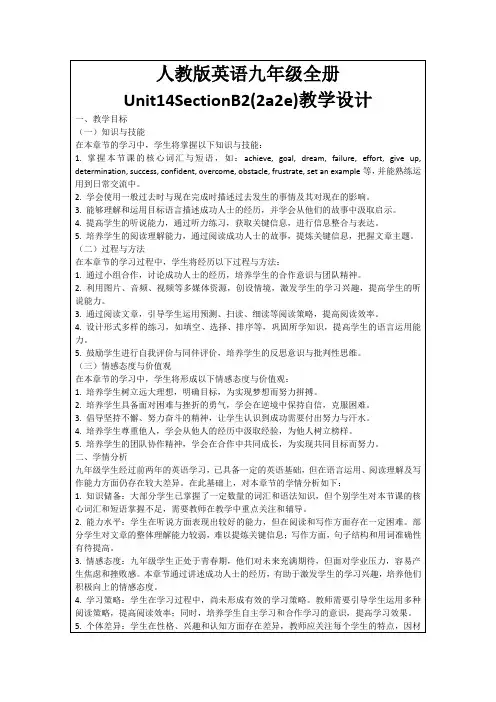
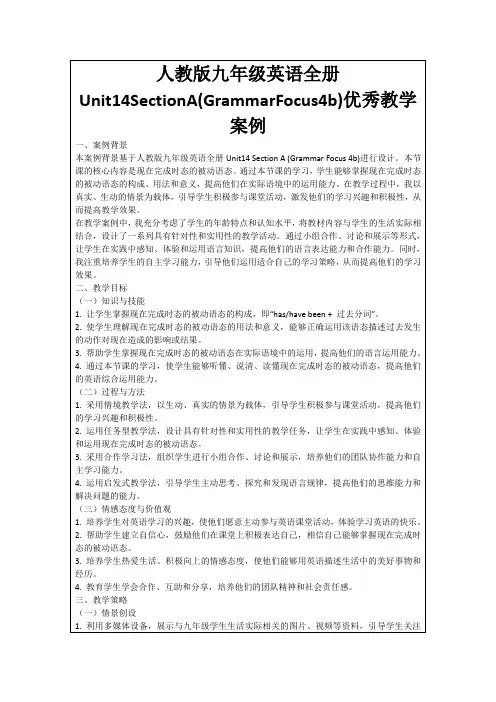
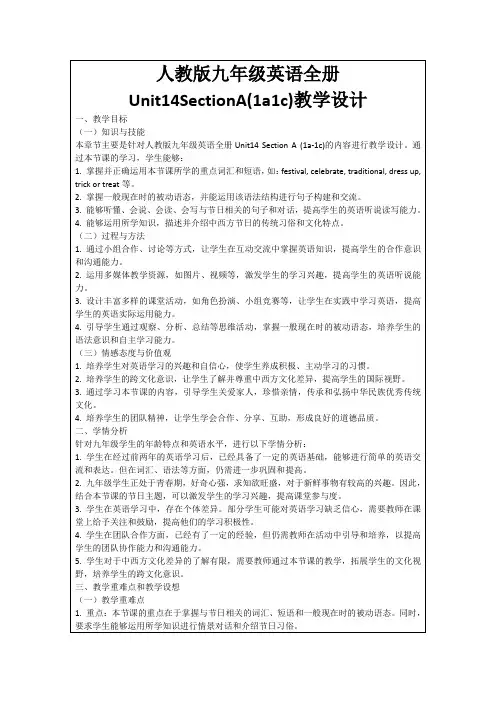
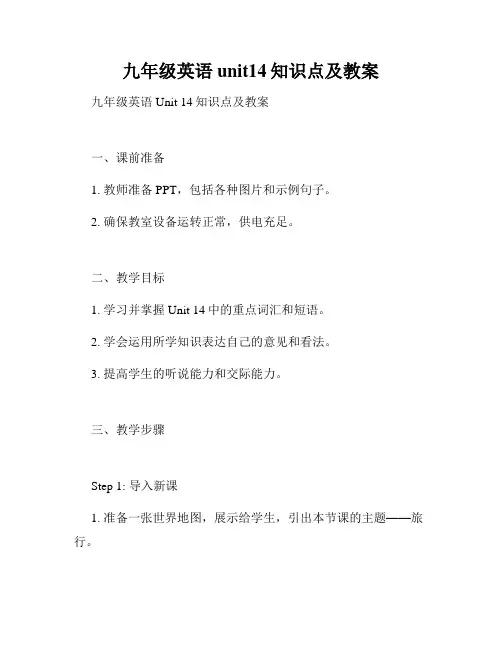
九年级英语unit14知识点及教案九年级英语Unit 14知识点及教案一、课前准备1. 教师准备PPT,包括各种图片和示例句子。
2. 确保教室设备运转正常,供电充足。
二、教学目标1. 学习并掌握Unit 14中的重点词汇和短语。
2. 学会运用所学知识表达自己的意见和看法。
3. 提高学生的听说能力和交际能力。
三、教学步骤Step 1: 导入新课1. 准备一张世界地图,展示给学生,引出本节课的主题——旅行。
2. 让学生观察地图,询问他们曾经去过的地方,并让他们谈谈对于旅行的看法。
Step 2: 学习重点词汇和短语1. 教师通过PPT展示Unit 14中的重点词汇和短语,包括travel, journey, destination, accommodation, sightseeing等。
2. 让学生跟读、背诵和理解这些词汇和短语,并举例子来加深理解。
Step 3: 学习重点句型1. 教师通过PPT展示不同句型,如“I enjoy traveling because…”、“I think traveling is…”以及它们的否定形式。
2. 让学生模仿示例句子,并根据自己的实际情况进行创作。
鼓励学生用不同的连词、形容词或副词来表达自己的感受和看法。
3. 可以进行小组活动,让学生与同桌分享自己的句型,并互相提出问题或提供建议。
Step 4: 听力训练1. 准备一段关于旅行的短文或对话,播放给学生两遍。
2. 让学生听一遍短文或对话后,回答相关的问题。
通过检查答案,帮助学生理解听力材料,提高他们的听力能力。
Step 5: 交流讨论1. 让学生结合自己的实际情况,谈论曾去过的地方,以及对这些地方的感受和看法。
2. 可以采用小组讨论的方式,让学生分享自己的经历,互相交流和倾听。
鼓励学生提出问题和回答问题。
3. 教师引导学生进行交流,并注意纠正他们的语法和用词错误。
Step 6: 形成小结1. 教师总结本节课的重点内容,回顾学习的知识点和句型。
九年级英语14单元教案【篇一:unit 14 全单元教案】unit 14 i remember meeting all of you in grade 7. 教案教学目标:1语言目标:掌握本单元重点词汇及复习语言点。
2 技能目标:能谈论过去和未来的生活.3 情感目标:珍惜初中生活的点滴,培养对高中、未来生活的憧憬。
树立远大人生目标。
教学重点:词汇: survey, standard, row, keyboard, method, instruction, text, level, degree, manager,gentleman, task, wing, double, shall, overcome, congratulate, caring, senior, thirsty, thankful, separate, ours, ahead短语: in a row, look back at, make a mess, keep one’s cool, senior high, go by, believe in, first ofall, be thirsty for, be thankful to sb., ahead of, along with, be responsible for, set out, separate from句子: she helped you to worked out the answers yourself no matter how difficulty they were. how have you changed since you started junior high school?i’ve become much better at speaking english.what are you looking forward to?i’m looking forward to going to senior high school.教学难点:对过去事件的描述。
九年级英语14单元教案【篇一:unit 14 全单元教案】unit 14 i remember meeting all of you in grade 7. 教案教学目标:1语言目标:掌握本单元重点词汇及复习语言点。
2 技能目标:能谈论过去和未来的生活.3 情感目标:珍惜初中生活的点滴,培养对高中、未来生活的憧憬。
树立远大人生目标。
教学重点:词汇: survey, standard, row, keyboard, method, instruction, text, level, degree, manager,gentleman, task, wing, double, shall, overcome, congratulate, caring, senior, thirsty, thankful, separate, ours, ahead短语: in a row, look back at, make a mess, keep one’s cool, senior high, go by, believe in, first ofall, be thirsty for, be thankful to sb., ahead of, along with, be responsible for, set out, separate from句子: she helped you to worked out the answers yourself no matter how difficulty they were. how have you changed since you started junior high school?i’ve become much better at speaking english.what are you looking forward to?i’m looking forward to going to senior high school.教学难点:对过去事件的描述。
课时划分:period 1 section a 1 1a – 2dperiod 2 section a 2 3a-3cperiod 3 section a 3 grammar focus-4bperiod 4 section b 1 1a-2eperiod 5 section b 2 3a-self checkperiod 1 section a 1 (1a – 2d)step 1. warming up1. do you have any special memories of junior high school?2. which teachers will you miss the most after junior high school?step 2. work on 1a. practice in pairs using the information in1a.step 3. listening 1b1. work on 1b. listen and match the memory with the person.2. listen again and answer the questions.1) what did mary lose in grade 7?2) who helped her find it?3) what kind of person is mr. brown? is he strict with students?4) what did peter do to meet mr. brown’s standards? with your partner.step 5 language points:1. _________ doing a school survey.survey 作可数名词,意为“调查;测量”,复数形式为surveysthe results of the survey made fascinating reading.the survey has a margin of error of 2.5%.the current survey will have a wider geographical spread.survey还可作动词,意为“测量土地;调查;勘测”,过去式为surveyed ,过去分词为surveyed,现在分词为surveying ,第三人称单数为surveys。
the explorers climbed a mound to survey the land around them.they have started to survey the country that the new motorway will pass through.2. did homework carefully to meet the standards of a strict teacher.standard 作可数名词,意为“标准;水平”,复数形式为standards。
the standard rate of income tax was cut to 23p in the pound.the paper was of non-standard size.i try to live up to the high standard of the school.【拓展】row作可数名词,意为“一排;一列;一行”。
如:a row of identical houses 完全一样的一排房子a row of trees 一行树木a row of small windows jutted out from the roof.several men are pushing school desks and chairs into neat rows. √) the facts you hear. listen again and fill in the blanks.too. luke remembers when that’s life _______ at school. t hey wrote a _____ to the band _______ to come.junior high has been ______, but it has been a lot of__________. step 9. work on 2d. role-play the conversation.let ss read the text and answer the questions.1) which teachers will they miss?2) what subjects do the teachers teach?3) why will they miss them?4) what will they do to thank them?step 10. language points1. at junior high school, i remember a friend helping me with a problem.在中学时,我记得一个朋友曾经帮助我解决问题。
help sb. with sth.意为“帮助某人干某事”。
lucy often helps her mother with housework on sunday.help构成的短语:help oneself自助, (进餐时) 自己取用can’t help doing sth.禁不住做某事with the help of… 在……的帮助下children, help yourselves to some fruits.i couldn’t help crying.with the help of the neighbors, the fire was at last brought under control.2. …remember losing a schoolbag full of homework. ……记得丢失了装满作业的书包。
remember vt. vi. 记起;想起。
常与to + n.及that连用。
例如:he remembered that he had to finish the homework by the next day.remember to与名词连用时,表示:“请向……致意;代向……致意”。
please remember me to your mother.remember句型remember doing sth. remember to do sth.1)当动名词所表示的动作发生在前时,则用remember doing sth.。
例如:i remember reading about the earthquake in the newspaper.(read这一动作发生在前,remember这一动作发生在后。
)(2)当remember本身表示发生在前的动作时,后面接不定式。
例如:i’ll remember to ring bill.(remember这一动作发生在ring这个动作之前。
)◇remember的此种用法也适用于forget句型。
例如:i’ll never forget waiting for you in the rain for the whole night.(wait这一动作发生在前,forget这个动作发生在后。
)he often forgets to close the door.(forget这一动作发生在close这个动作之前。
)step 11 exercises:step 12 homeworklearn the new words and phrases by heart after class.read the articles in page 1 of learning english. the more you read, the faster and better you’ll understand.preview the article on page 107.period 2 section a 2 (3a–3b)step 1 revision学校调查 school survey连续几次地 in a row达标 meet the standard休息 take a break清楚地指示 clear instructions对某人有耐心的 be patient with sb解决 work out指导某人做事guide sb to do投入更多的努力 put in more effortstep 2. warming up i remember…step 3. reading work on 3a. read the passage and answer the questions.1) what kind of writing is this?2) what is the main subject of this writing?3) who do you think the writer is? how does the writer feel about them?1) trying to be on time for morning readings2) running to the dining hall when the lunch bell rings3) training for sports day4) starting the first day in grade 75) slowly making some new friends6) helping classmates with homework7) preparing for art festivals8) going to new year’s parties9) learning englishstep 6. language points1. looking back at these past three yearsi remember many thingstrying to be on time for morning readingsrunning when the lunch bell ringslook back at 回顾grandma. 每当回忆童年生活,我总是忍不住想念我亲爱的祖母。